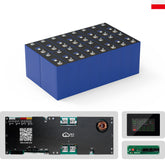Choosing the Right 72V Lithium Battery Charger Made Simple
The right 72V lithium battery charger is essential for keeping your high-voltage battery systems safe, efficient, and long-lasting. Whether you’re using it for an electric scooter, e-bike, or industrial application, making the right choice involves understanding key features, voltage compatibility, and safety protocols. This comprehensive guide explores everything you need to know about selecting the ideal charger. Remember, a mismatched charger can shorten battery life or even cause hazards—so choose wisely when selecting your 72V lithium battery charger.
- Understanding the Basics of a 72V Lithium Battery Charger
- Key Features to Look for in a 72V Lithium Battery Charger
- How to Match a Charger with Your 72V Lithium Battery
- Popular Use Cases for a 72V Lithium Battery Charger
- Charging Time and Efficiency Considerations
- Compatibility with Battery Management Systems (BMS)
- Choosing Between Fan-Cooled and Fanless Chargers
- Waterproof and Outdoor Usage
- Top Brands Offering Reliable 72V Lithium Battery Chargers
- Maintenance Tips for a 72V Lithium Battery Charger
- Troubleshooting Common Charging Issues
- Tips for Safe Charging Practices
- Where to Buy a Reliable 72V Lithium Battery Charger
- Make the Smart Choice for Your 72V Lithium Battery Charger
Understanding the Basics of a 72V Lithium Battery Charger
Before diving into specific features or buying decisions, let’s break down what makes a 72V lithium battery charger different from other chargers on the market.
What Does 72V Mean?
A 72V battery consists of a series of lithium-ion cells that produce a nominal voltage of 72 volts. These are typically configured as 20 cells in series (20s), each with a nominal 3.6V or 3.7V. Fully charged, the battery voltage can reach up to 84V, and a suitable charger must recognize this maximum.
Why Lithium?
Lithium-ion batteries offer higher energy density, lighter weight, and longer lifespan than lead-acid alternatives. They also have unique charging requirements, which means a regular 72V lead-acid charger won't suffice for lithium systems.
Key Features to Look for in a 72V Lithium Battery Charger
When selecting the right 72V lithium battery charger, there are several critical features to examine closely.
Voltage and Current Ratings
Ensure the charger outputs the correct voltage and current levels suitable for your battery pack. Overcharging or undercharging can degrade battery performance or cause safety risks.
Output Voltage: Should match the battery’s full charge voltage (usually 84V for a 72V nominal pack).
Output Current: Affects charge time. Common values range from 5A to 20A.
Battery Chemistry Compatibility
Your charger must be explicitly designed for lithium-ion chemistry. Some chargers may support multiple chemistries (Li-ion, LiFePO4, etc.), so make sure to choose one that matches your exact battery type.
Safety Features
Important protection mechanisms include:
Overvoltage Protection
Overcurrent Protection
Short Circuit Protection
Temperature Monitoring
Reverse Polarity Protection
Smart Charging Capabilities
Modern 72V lithium battery chargers often feature smart BMS (Battery Management System) integration. These chargers can:
Communicate with the BMS to balance cells
Automatically adjust charging profiles
Provide diagnostic data through LED or digital displays
>>See also The Importance of Knowing a Golf Cart’s Weight Limit
How to Match a Charger with Your 72V Lithium Battery
Read the Battery Specifications
Start by checking your battery’s datasheet or label for:
Nominal and maximum voltage
Recommended charge current
Cell configuration (e.g., 20S4P)
Check the Charger Label
Verify that the charger you’re considering:
Outputs exactly 84V for a full charge
Delivers a current that your battery can safely handle
States clear compatibility with lithium-ion batteries
Assess Connector Type and Polarity
Make sure the charger plug matches your battery’s input port. Incorrect polarity can damage your battery or render the charger useless.
Popular Use Cases for a 72V Lithium Battery Charger
Understanding the applications can help you decide which model to buy. Let’s explore common scenarios:
Electric Scooters and Motorcycles
High-speed electric scooters and bikes rely heavily on robust 72V lithium battery chargers to ensure performance and range.
Industrial Equipment
Machines like warehouse AGVs (automated guided vehicles) or portable power units often use custom battery packs and need chargers with programmable profiles.
Solar Energy Storage
Some home energy storage solutions utilize 72V battery packs, requiring highly efficient chargers that support renewable input and regulated charging.
Charging Time and Efficiency Considerations
How to Estimate Charging Time
Use the formula:
Charging Time = Battery Capacity (Ah) / Charger Output (A)
Example: A 30Ah battery with a 10A charger will take approximately 3 hours to charge (plus 10% for losses).
Fast vs. Slow Charging
Fast charging (15A–20A) is time-saving but can generate more heat and reduce battery longevity if done frequently. Slow charging (5A–10A) is safer and better for long-term health.
Compatibility with Battery Management Systems (BMS)
A proper 72V lithium battery charger should communicate effectively with the BMS to:
Detect balancing needs
Halt charging if a fault is detected
Ensure uniform voltage across cells
BMS compatibility prevents issues like overcharging and cell imbalance, both of which can severely shorten battery life.
Choosing Between Fan-Cooled and Fanless Chargers
Fan-Cooled Chargers
Pros: Handle higher current, faster charging
Cons: Noisier, prone to dust accumulation
Fanless Chargers
Pros: Silent, more durable
Cons: Usually support lower charging currents
Pick based on your needs—whether it’s for home use (quieter) or heavy-duty applications (higher output).
Waterproof and Outdoor Usage
If you're using your 72V lithium battery charger in outdoor or harsh environments, look for:
IP65 or higher waterproof ratings
Rugged aluminum casings
Insulated and sealed connectors
Waterproof chargers are especially useful for electric bikes and scooters used in all weather conditions.
Top Brands Offering Reliable 72V Lithium Battery Chargers
Grin Technologies
Known for programmable chargers with robust thermal protection and adjustable output.
LiTech Power
Offers efficient, high-output chargers tailored to lithium-ion battery specifications.
Mean Well
Provides reliable industrial-grade options with global certifications and long lifespan.
Maintenance Tips for a 72V Lithium Battery Charger
To prolong the lifespan and reliability of your charger:
Keep it clean and dust-free
Avoid exposing to moisture unless it’s waterproof
Store in a dry, cool place
Don’t block ventilation openings (if fan-cooled)
Unplug when not in use to avoid phantom load or accidental surges
Troubleshooting Common Charging Issues
Charger Not Powering On
Check AC power source
Inspect for blown fuses or tripped breakers
Battery Not Charging Fully
BMS may be limiting charge due to imbalance
Charger voltage might be too low
Damaged cables or connectors
Charger Gets Too Hot
Ensure it's not placed on heat-retaining surfaces
Try reducing charge current or using a lower ambient temperature environment
>>See also Understanding How Screen Transparency Impacts Battery Life
Tips for Safe Charging Practices
To ensure both safety and battery longevity:
Always use a charger rated for your battery's chemistry and voltage
Charge in a fire-safe location
Avoid charging unattended for long periods
Monitor the charger during initial use with a new battery
Where to Buy a Reliable 72V Lithium Battery Charger
You can purchase reliable 72V lithium battery chargers from:
Official battery or e-mobility brand websites
Online retailers like Amazon, BatteryHookup, and Alibaba
Local electronics and EV supply stores
Make sure the charger is certified (e.g., CE, UL) and comes with a warranty.
Make the Smart Choice for Your 72V Lithium Battery Charger
Choosing the right 72V lithium battery charger is more than just matching voltages—it's about ensuring compatibility, safety, efficiency, and long-term battery health. From understanding current ratings and BMS communication to selecting trusted brands, this guide gives you the tools to make an informed decision. Always refer to your battery manufacturer’s specifications, and never compromise on charger quality.
A 72V lithium battery charger is a critical investment in the performance and safety of your energy system. Choose wisely, and your battery will reward you with years of reliable service.
























Leave a comment
All blog comments are checked prior to publishing